The New Skills ready network (NSrn) is part of JPMorgan Chase’s substantial portfolio in support of an inclusive economy and workforce. This five-year commitment is part of the New Skills at Work initiative to prepare people for the future of work and their $30 billion commitment to advance racial equity. With a dedication to building equitable career pathways, the New Skills ready network connects six sites — Boston, Massachusetts; Columbus, Ohio; Dallas, Texas; Denver, Colorado; Indianapolis, Indiana; and Nashville, Tennessee — with local partners with the intentionality necessary to build a strong workforce ecosystem for all learners.
 Denver, Colorado’s vision for the NSrn initiative, aims to “dramatically increase the number and diversity of students who complete selected high-quality career pathways that start in high school, continue into and through higher education, and lead to good jobs in Denver’s labor market.”
Denver, Colorado’s vision for the NSrn initiative, aims to “dramatically increase the number and diversity of students who complete selected high-quality career pathways that start in high school, continue into and through higher education, and lead to good jobs in Denver’s labor market.”
Over the past three years, the project team has achieved significant milestones in the development of high-quality, equitable career pathways including building a shared data framework, aligning work-based learning opportunities within high-quality career pathways and enhancing the learner experience when transitioning from secondary to postsecondary institutions. Under the leadership of the site lead, The Attainment Network, the project team leverages strategic cross-sector partnerships while centering equity and learner voice to enhance and improve their career pathways work.
A critical component of the Denver, Colorado, site work includes centering and leveraging the voices of learners to understand their experiences, barriers and opportunities and shaping career pathways aligned with their needs.In April 2023, The Attainment Network held their second annual Learner Voice Symposium which brought together an audience of educators, employers and policymakers to hear directly from Colorado learners what they seek in career-connected pathways and how they define success.
Haley Wing, Senior Policy Associate, Advance CTE, interviewed Rana Tarkenton, Chief Operating Officer, The Attainment Network to discuss the importance of leveraging learner voice in career pathways and how others might replicate their efforts to meaningfully engage learners in the design and implementation of career pathways.
Overview of the Learner Voice Symposium Event
The purpose of the Learner Voice Symposium is to elevate highlights from learners’ diverse perspectives and backgrounds and provide actionable insights to improve and expand pathways for all learners. The Symposium serves as a reminder to partners of the reason why they engage in this work and elevates the voices of learners who are not always invited to the table when developing and implementing career pathways. Learners, who are not simply the receivers of the work of career pathways, but rather the experts in their experiences, provide critical feedback to leaders.
The Symposium fills a gap in the career preparation ecosystem in Colorado; leaders developing career-connected pathways are continuously striving to improve the system and learners are disconnected from the leaders who need to hear their voices most. The Attainment Network identified this gap and provides career pathway partners the space to listen to and reflect learner voices in their work in the form of The Symposium.
The Symposium held virtually on Zoom, included a keynote speaker who is a practitioner that engages with learners frequently and specializes in community engagement, and breakout sessions that are co-led by learners who are compensated for their time and expertise. The Symposium is attended by a wide audience including practitioners in secondary and postsecondary education, college and career advisors, state agency providers, policymakers and employer partners.
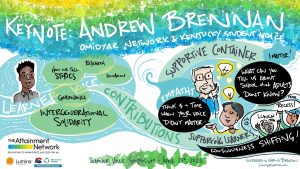
Participants have the opportunity to attend breakout sessions of their choosing covering topics like authentic youth engagement in career pathways, immigrant and undocumented learner experiences, non-traditional learners and pathways and more. Presenting organizations that support the sessions include Ednium, The San Luis Valley Boys & Girls Clubs, Emily Griffith Technical College, MSU Denver and more.
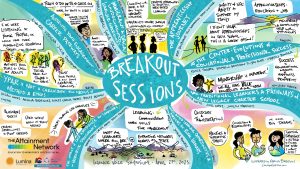
All of the information shared during The Learner Voice Symposium is centered on elevating the experiences of learners and incorporating their voices in the development of career-connected pathways. At the close of The Symposium, The Attainment Network announced their Learner Voice Grants that organizations and institutions can apply for to support and enhance their meaningful learner engagement efforts.
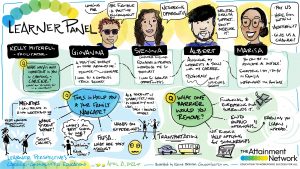
Impact of The Learner Voice Symposium on the New Skills ready network
The learner engagement in The Learner Voice Symposium supports the Denver, Colorado, New Skills ready network team in their communications strategies as they develop materials and messaging to better connect learners and families to career-connected pathway opportunities. Additionally, Denver Public Schools (DPS), a secondary partner for the New Skills ready network site, and the Colorado Department of Higher Education (CDHE) are two of the grantees for the Learner Voice Grant. DPS and CDHE leverage the grant funding to support their learner engagement work in the development of local and state-level career pathways.
With more than 175 attendees of The Symposium, The Attainment Network models meaningful learner engagement for its system-wide network. The Network, being a statewide intermediary, supports strengthening the career pathway ecosystem and strengthens relationships with system partnerships that impact learners.
Further, the Denver, Colorado, project team also elevates the voices and feedback from learners in state-level policy. The Attainment Network, alongside the Colorado Department of Education and the Colorado Community College System, led an effort to design, collect, and report on community input to inform the HB22-1215 Secondary, Postsecondary and Work-Based Learning Integration Task Force (Study of Expanding High School Programs).
Recommendations delivered to the Task Force focus on equitable access to and successful expansion of high school programs across all regions of Colorado with a focus on traditionally underserved populations and those who have not accessed relevant programming in their educational experience. The discovery process of community feedback collection leveraged community organizations, educational organizations, and local partnerships.
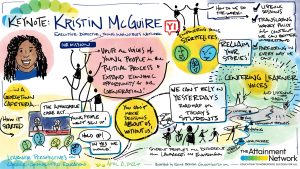
Replicating Meaningful Learner Engagement
Leveraging learners’ input and feedback in the development of career pathways, CTE programs and policies is a valuable component of program improvement. Leaders who are interested in replicating The Learner Voice Symposium should prioritize including learners whose voices are historically underrepresented, leveraging partners who can support recruiting learners to bring them to the table and co-creating the event with partners and learners to ensure the content fills the needs for the ecosystem.
The Attainment Network engages in the planning and execution of The Symposium with an equity lens to ensure a diverse representation of learners, speakers and attendees. The Network also backward plans by prioritizing the outcomes they want the event to achieve from the start of the planning process to ensure there are sessions with meaningful outcomes and takeaways for attendees.
The planning and execution of an event of this size includes a lot of logistics and leaders should consider adequate staffing, preparation that helps to keep audiences engaged and ensuring the videos and notes from the event are accessible once the event is over. The addition of a visual scribe enhances the experience for attendees throughout the session, as well as providing engaging artifacts to further share learnings after the event and marketing for future events.
Looking Ahead
As The Attainment Network enters year four of the New Skills ready network, the project team is working towards holding more learner and community engagement events to continue the work of leveraging learner voices, input and feedback in the design and delivery of career pathways. The Network team is currently working on analyzing themes from The Learner Voice Symposium to inform the design of their Colorado Pathways Conference on September 19 – 20. The two-day conference will focus on pathways-focused education-to-workforce systems across the state and country.
Haley Wing, Senior Policy Associate
 I could not be more delighted to join the team here at Advance CTE! A self-proclaimed “Career Technical Education (CTE) evangelist,” I’ve spent much of my career designing, implementing and supporting policies and practices that create the conditions for high-quality CTE to flourish, and have had the pleasure to learn from and work alongside the Advance CTE team and members over those years. As a former State CTE Director and Advance CTE member, it is an honor to be able to give back to an organization that has given so much to me and to the field at large.
I could not be more delighted to join the team here at Advance CTE! A self-proclaimed “Career Technical Education (CTE) evangelist,” I’ve spent much of my career designing, implementing and supporting policies and practices that create the conditions for high-quality CTE to flourish, and have had the pleasure to learn from and work alongside the Advance CTE team and members over those years. As a former State CTE Director and Advance CTE member, it is an honor to be able to give back to an organization that has given so much to me and to the field at large.

 The Senate reconvened this week following its annual August recess. Lawmakers in the House are due back to Capitol Hill next week. On their return to Washington, D.C., the Senate has focused primarily on addressing Congress’s failure to complete work on the fiscal year 2024 (FY24) budget before the new fiscal year begins on October 1. Just before August recess, the Senate appropriations committee successfully advanced all 12 of the individual appropriations bills that compose the federal budget on a bipartisan basis but these proposals have yet to be approved by the full chamber and reconciled with forthcoming proposals in the House.
The Senate reconvened this week following its annual August recess. Lawmakers in the House are due back to Capitol Hill next week. On their return to Washington, D.C., the Senate has focused primarily on addressing Congress’s failure to complete work on the fiscal year 2024 (FY24) budget before the new fiscal year begins on October 1. Just before August recess, the Senate appropriations committee successfully advanced all 12 of the individual appropriations bills that compose the federal budget on a bipartisan basis but these proposals have yet to be approved by the full chamber and reconciled with forthcoming proposals in the House.  Tell me more about your journey to the Fellowship.
Tell me more about your journey to the Fellowship.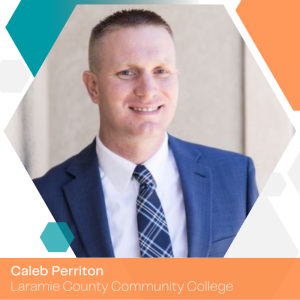 I was made aware of the Fellowship through the Wyoming State CTE Director Michelle
I was made aware of the Fellowship through the Wyoming State CTE Director Michelle  Distance learning breaks down geographical barriers, enabling students from remote or underserved areas to access high-quality CTE programs. By offering online courses, CTE programs can reach a broader audience of learners, including those who may face obstacles in attending traditional in-person classes. This increased accessibility can result in a more diverse and inclusive CTE learner population. The fifth principle of
Distance learning breaks down geographical barriers, enabling students from remote or underserved areas to access high-quality CTE programs. By offering online courses, CTE programs can reach a broader audience of learners, including those who may face obstacles in attending traditional in-person classes. This increased accessibility can result in a more diverse and inclusive CTE learner population. The fifth principle of 
 Overall, micro-credential earners interviewed for this study perceived their experiences favorably and believed that efforts to earn such credentials would result in economic mobility through higher education and income levels. Earners indicated that micro-credentials allowed for more timely feedback and that each credential motivated earners to continue their progression. While stakeholders remain optimistic about the value of micro-credentials, many earners are still unsure of how earning micro-credentials may or may not impact their long-term employment trajectories.
Overall, micro-credential earners interviewed for this study perceived their experiences favorably and believed that efforts to earn such credentials would result in economic mobility through higher education and income levels. Earners indicated that micro-credentials allowed for more timely feedback and that each credential motivated earners to continue their progression. While stakeholders remain optimistic about the value of micro-credentials, many earners are still unsure of how earning micro-credentials may or may not impact their long-term employment trajectories. Administration of a CTE program with an equity lens begins with ensuring all learners have meaningful access to and substantial engagement in high-quality CTE programming which requires making these actions a priority. Ohio has created and applied equity-minded leadership principles within
Administration of a CTE program with an equity lens begins with ensuring all learners have meaningful access to and substantial engagement in high-quality CTE programming which requires making these actions a priority. Ohio has created and applied equity-minded leadership principles within  The application of equity-minded principles isn’t a one-time occurrence. It requires an ongoing systematic review of policies, practices and data to determine the effectiveness of the mitigating or transformational strategies being applied. Indiana engaged in this process by conducting a review of the CTE equity labs being offered in their state and using additional resources to measure goal attainment and to provide additional supports to local leaders.
The application of equity-minded principles isn’t a one-time occurrence. It requires an ongoing systematic review of policies, practices and data to determine the effectiveness of the mitigating or transformational strategies being applied. Indiana engaged in this process by conducting a review of the CTE equity labs being offered in their state and using additional resources to measure goal attainment and to provide additional supports to local leaders. 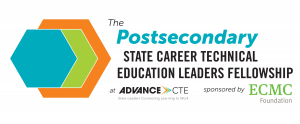
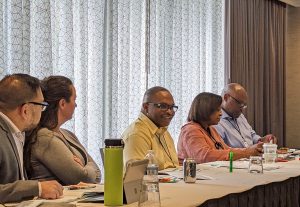
 Overview
Overview  Denver, Colorado’s
Denver, Colorado’s 


